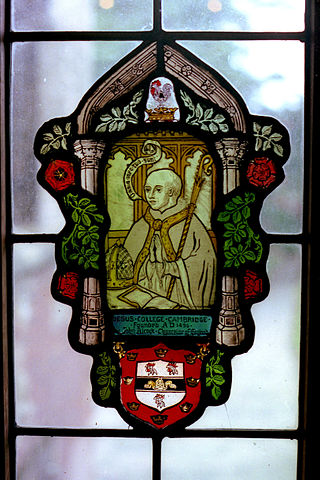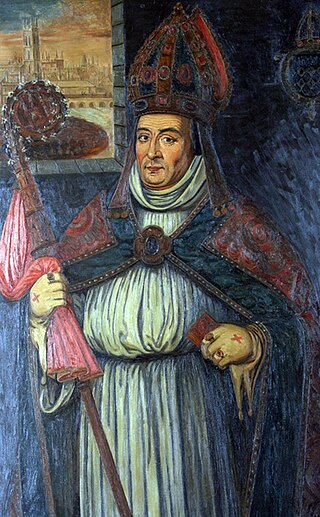Related Research Articles

John Alcock was an English churchman, bishop and Lord Chancellor.
The Lord High Chancellor of Ireland was the highest judicial office in Ireland until the establishment of the Irish Free State in 1922. From 1721 to 1801, it was also the highest political office of the Irish Parliament: the Chancellor was Speaker of the Irish House of Lords. The Lord Chancellor was also Lord Keeper of the Great Seal of Ireland. In all three respects, the office mirrored the Lord High Chancellor of Great Britain.

Richard Poore or Poor was a medieval English bishop best known for his role in the establishment of Salisbury Cathedral and the City of Salisbury, moved from the nearby fortress of Old Sarum. He served as Bishop of Chichester, Bishop of Salisbury and Bishop of Durham.

William Waynflete, born William Patten, was Provost of Eton College (1442–1447), Bishop of Winchester (1447–1486) and Lord Chancellor of England (1456–1460). He founded Magdalen College, Oxford and three subsidiary schools, namely Magdalen College School in Oxford, Magdalen College School, Brackley in Northamptonshire and Wainfleet All Saints in Lincolnshire.

Richard of Chichester, also known as Richard de Wych, is a saint who was Bishop of Chichester.
John Langton was a chancellor of England and Bishop of Chichester.
William Alnwick was an English Catholic clergyman. He was Bishop of Norwich (1426–1436) and Bishop of Lincoln (1436–1449).
Henry Ware was a medieval clergyman who became a diplomat and Lord Privy Seal for King Henry V of England from 1416 to 1418. He later became the Bishop of Chichester. Originally from Wales, Ware served as a canon from the 1390s and then studied law, of which he was made a master, at Oxford University. He later became an official in the court at Canterbury. He also spent some time in diplomatic missions to France. In early 1418 he was elected bishop of Chichester, and was consecrated in July 1418. He died in July 1420, between the 7th and the 26th.

George Day was the Bishop of Chichester.
Philip Morgan was a Welsh clergyman who served as Bishop of Worcester (1419–1426), then as Bishop of Ely (1426–1435).

John Arundel was a medieval Bishop of Chichester.

Richard FitzJames was an English academic and administrator who became successively Bishop of Rochester, Bishop of Chichester, and Bishop of London.
John Carpenter (1399–1476) was an English bishop, provost, and university chancellor.

John Kaye was a British churchman.
Richard Curteys (c.1532?–1582) was an English churchman. A native of Lincolnshire, after his education at St. John's, Cambridge he was ordained and eventually became Chaplain to Queen Elizabeth I. He was made the Dean of Chichester Cathedral and then Bishop of Chichester. Curteys was reputedly a promoter of preaching and the clerical improvement of Anglicanism. In Curteys' episcopate, the cost of supporting many residentiaries and providing hospitality, could not be funded by the relatively small income of Chichester Cathedral. Curteys remodelled the constitution to reduce costs. Despite the changes Curteys died penniless.
Richard Howland (1540–1600) was an English churchman and academic, Master of Magdalene College, Cambridge, and of St John's College, Cambridge, and bishop of Peterborough.

Edward Parry was Church of Ireland Bishop of Killaloe, County Clare, Ireland from 28 March 1647 until his death 20 July 1650.
Richard Talbot was an English-born statesman and cleric in fifteenth-century Ireland. He was a younger brother of John Talbot, 1st Earl of Shrewsbury. He held the offices of Archbishop of Dublin and Lord Chancellor of Ireland. He was one of the leading political figures in Ireland for more than thirty years, but his career was marked by controversy and frequent conflicts with other statesmen. In particular, the Talbot brothers' quarrel with the powerful Earl of Ormonde was the main cause of the Butler–Talbot feud, which dominated Irish politics for decades, and seriously weakened the authority of the English Crown in Ireland.

Thomas Boleyn, LL.B, , was the Master of Gonville Hall, Cambridge from 1454 to 1472, the seventh to hold that position. During the later 1440s, through three separate acts of foundation, he was one of the small group appointed to formulate the statutes of what became Queens' College in Cambridge. His brother Sir Geoffrey Boleyn, Lord Mayor of London 1457-58, was the great-grandfather of Anne Boleyn, Queen consort of England.
John Howorth, D.D. was a 17th-century priest and academic.
References
- 1 2 3 William Richard Wood Stephens, 1876. Memorials of the South Saxon See and Cathedral Church of Chichester, page 137
- 1 2 3 Jacob, E.F., 1956. St. Richard of Chichester, The Journal of Ecclesiastical History, 7(2)
- ↑ CHANCELLORS OF CAMBRIDGE UNIVERSITY 1246-1950, genuki.org.uk
- 1 2 3 Hay, A., The History of Chichester: Interpersed with Various Notes and Observations .., page 456
- ↑ Dobson, R.B., 2005. Durham Priory 1400-1450, Cambridge University Press , page 157
- ↑ Fryde, et al. Handbook of British Chronology p. 239
- ↑ Henry VI, 1430: CP40no677, By Rosemary Simons, aalt.law.uh.edu